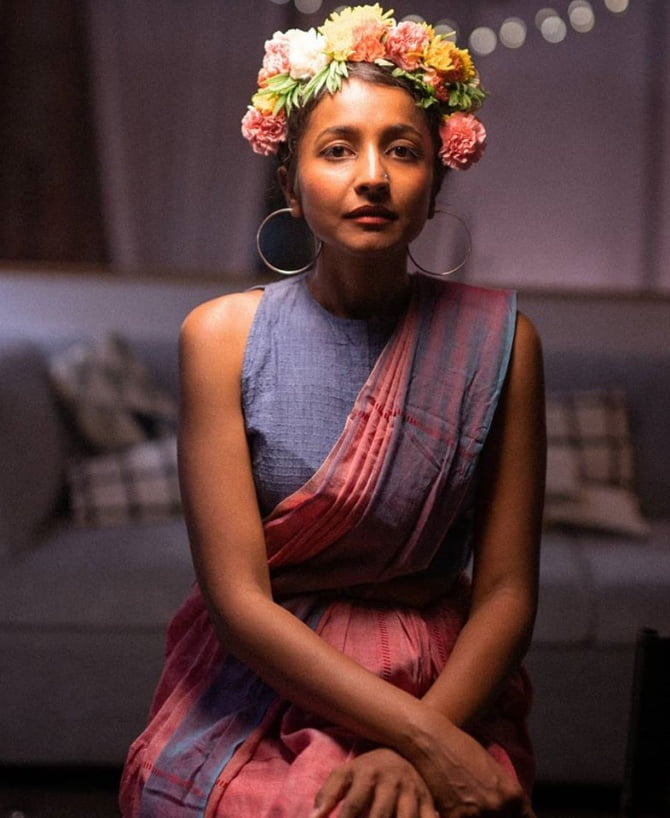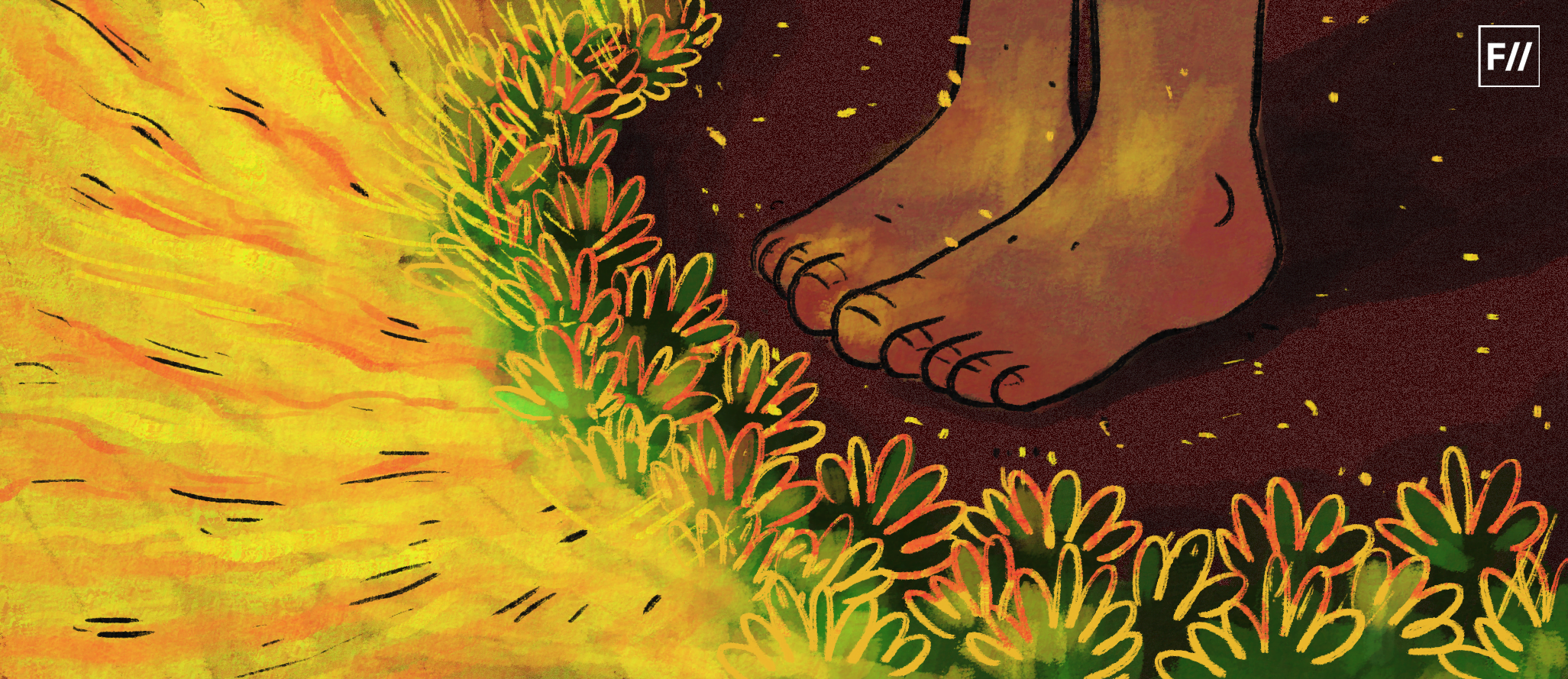Aditi Veena aka Ditty is a unique voice in India’s music sphere. As an independent artist, she stands for causes that have immediate implications on humanity. Humanitarian issues like climate change and gender inequality inspire her music and work. Her music employs artivism in order to reclaim spaces from commercialisation and ecological destruction. Additionally, in her work as a conservation architect, she develops several environmental conservation projects.
She spent her formative years being exposed to a strong love for nature by her mother who is a botanist. Ditty was a student of architecture at the School of Planning and Architecture, New Delhi. It was during this time she realized “the gruesome realities of capitalism“. Thus, seeing the world through new light helped her change her worldview and use her talent for urban ecology and musical environmentalism.
Streets For Us
Ditty has spent a significant part of her career busking on the roads of India, Nepal and Sri Lanka. In 2016, along with her friend filmmaker Lakshya Dhungana, she started a project called “Streets For Us”. This would entail impromptu audio-visual performances for street audiences. With a minimalist set up including a guitar, microphone and an amplifier, Ditty serenaded strangers on the streets. In addition, they would put up a bedsheet and use a projector to show short movies of the ocean, in the background.
The aim of her project was to open up a dialogue between the listeners about how unsafe the streets have become. They filmed people’s responses to her playing music in the streets. In Nepal and Sri Lanka, people gathered to hear her sing and reacted with love. However, in India things were a lot more difficult. Outside a popular bar in Vasant Vihar in New Delhi, drunken men heckled them. Someone tried to push her and snatch her mic in order to sing instead. People even scolded them about how unsafe their actions were. People repeatedly asked them to go home. Her friend Dhungana even got arrested in Mumbai. What was her fault? Setting up her camera!
Also read: Hirabai Barodekar: First Indian Woman Artist To Hold Ticketed Concerts
Public Performance as a Female artist
During her college days Aditi wrote a thesis about performing in public spaces and designing spaces for public performing arts. Her busking activities reveal the inaccessibility of public spaces for women in cities like Delhi and Mumbai. While the experience in Nepal and Sri Lanka despite the language barrier was positive and encouraging. On the other hand, the streets in India’s metropolitan cities were seeped in risk. It involved catcalling, lewd comments, public manhandling and discouragement. The worse came in the way of misogynistic policing. In the book, Why Loiter?: Women and Risk on Mumbai Streets, Shilpa Phadke, Sameera Khan and Shilpa Ranade illustrate the lack of women’s claim to public spaces in the city. Thus, Ditty’s busking encounters reiterate universal feminist issues.
Ditty’s busking activities reveal the inaccessibility of public spaces for women in cities like Delhi and Mumbai.

Resisting Rape Culture
Indian mainstream music is infamous for sexism and propagation of rape culture. The steady barrage of degrading lyrics objectifying women’s bodies combined with visuals normalizing sexual harassment, stalking etc. has flooded our media and culture.
Also read: Genda Phool: Misogyny In Songs Continue Despite #MeToo Along With Plagiarism
Ditty’s songs are in contrast to this culture of misogyny and endorsement of the male gaze by Bollywood and mainstream media. Her role in the indie music scene is defined by ecofeminism. Her songs narrate her relationship with nature, sadness and desires. Ditty’s innermost thoughts are expressed in songs in a confessional tone. In her song called ‘Eulogy For A Sparrow’, she sings about endangered species and the killing of sharks for fins. Artists like her are the voice of resistance and a wake-up call to adopt feminism and environmental conservation.
In her song called ‘Eulogy For A Sparrow’, she sings about endangered species and the killing of sharks for fins. Artists like her are the voice of resistance and a wake-up call to adopt feminism and environmental conservation
Make Forests Not War
Ditty has named her creations “earth songs”, an apt moniker for her musical renditions to Mother Nature. Her latest project involves a carbon neutral tour of India. The first of its kind, this tour is designed to reduce carbon footprint. Music tours and concerts are a huge source of carbon footprint and environmental degradation. As an artist, she is taking active measures to opt for eco-friendly tours and concerts.
To counter the tour’s carbon footprint she has organized planting local, indigenous food forests in collaboration with Permaculturists like Claudiu Oprea. Therefore, these small but significant steps will help to counter the carbon emissions and enable afforestation. In this way, Ditty has sown the seeds of a revolutionary way of creating and consuming music.
Conclusion
An architect, environmentalist and musician, Aditi is a force to reckon with. In a way, Aditi Veena is following the tradition of singers like Joan Baez and Bhanwari Devi, who use their platform and voice for pertinent social issues.
She is spreading awareness about animal extinction, deforestation and womanhood through her melancholic singing, humanitarian performance and work as a conservation architect. Her lilting voice and waif like features deliver a mixture of spoken word poetry infused with lightly strummed guitar. She beautifully uses her art to focus on themes like nature conservation and sustainable living.
Featured Image Source: Roots And Leisure
About the author(s)
Sudeshna is an English Literature Postgraduate from Lady Shri Ram College, currently enrolled at the EditPub course in Jadavpur University. Working as a freelance writer, editor and digital marketer; she is a creative bohemian with a penchant for adventure and art.




